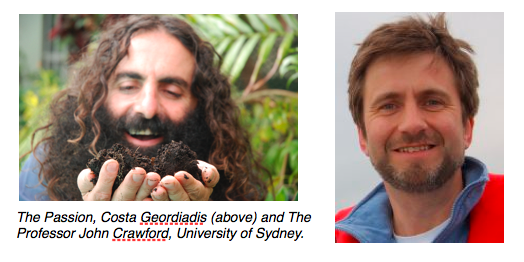“Those who think they have no time for healthy eating, will sooner or later have to find time for illness.” – Edward Stanley
The quote is coming from the self-confessed “half man-half hedge”, Costa Geordiadis, presenter of ABC’s Gardening Australia program. I’m sitting listening to some great speakers at “The Passion and The Professor” seminar for International Composting Awareness Week, and I’m delighted to finally see the links being made between sustainable food production and human health.

“Compost is the only place where we turn death into life.” Costa (clearly “the Passion” behind the seminar) goes on to elaborate. We’re in an industry of health not rubbish. Then he puts out the challenge to all of us to be wise in our choice of words. We’re no longer putting out the rubbish bin, we’re organising our “resource recovery stations”. With so much “resource” going into our weekly school and home rubbish collections, it is clear that the general householder is still not on board with the need to consider the long term implications of our purchasing choices.
 “Every time you spend our money, you’re casting a vote for the kind of world you want.” – Anna Lappe.
“Every time you spend our money, you’re casting a vote for the kind of world you want.” – Anna Lappe.
The quote this time, is echoed by “The Professor”, Sydney University’s Professor John Crawford for sustainable agriculture.
Our sights are erroneously focused disproportionately on TODAY without consideration towards the future legacy of our decisions.
Why aren’t we paying our farmers to grow food that makes us healthy anymore, asks the Professor. He suggests that our healthcare system should be renamed the “illness” care system because of the reactionary processes we formulate. The future of farming is in sustainable practices and preventative health measures.
It’s an alarming view put forward by the soil scientists, that we possibly have only 50 years (100 at best) of quality agricultural soil left for food production on the planet, under current land management practices. Our soils have become so depleted in minerals that even our fresh produce doesn’t supply the body with the primary building blocks to sustain life. Costa suggests that we should be fueling the health of our nation with a Minister for Compost, with a portfolio for recycled organics to achieve the levels of nutrition required.
The people who are going to make the difference to our food system are the 80% of the population living in urban situations. Quality soil and making compost provide an answer and every one of us can play our part.
The Professor shows us that soil is not just “worn out old rocks and a bit of dead stuff” but is the source of living organisms and recycled nutrients, it stores water and has the capacity to store more carbon than the atmosphere and all plants in the world combined. Soil carbon is the fuel that will run the world when other fossil fuels run out. He also suggests that soil organisms have the most endangered habitat on the planet with current patterns of soil degradation.

When microbes are “happy”, there is a flow of nutrients and oxygen that supports life and human health. Microbes have self-organisation of pore space (air) in the soil, achieved through an ideal ratio of fungi to bacteria. Compacted soil, however, has poor air filled porosity and limited capacity to recover and support life. Poor soil lacks nutrients to give us healthy bodies and exacerbates water stress. Under present conditions, by the year 2030 parts of Africa will suffer such severe water stress that plant growth will not be supported, suggests Professor Crawford.
Distopia, the opposite of utopia, is possible within 10 years, he says. The interconnectedness of global water stress and food insecurity leads to increasing food prices, giving rise to social unrest on many levels.
We need to move away from the Linear Economy of
Take=> Make=> Dispose
to the circular economy of recycling of technical and biological resources. If we keep buying nutrient deficient food and harmful consumer goods then people will keep making them, leaving us in a cycle of depravity and insecurity.
Our aim then, for soil security is to:
set a goal for sustainable development on all levels,
establish a commission for soil security within 12 months,
recommendations for secure soil by the year 2050.




 Twitter
Twitter Facebook
Facebook